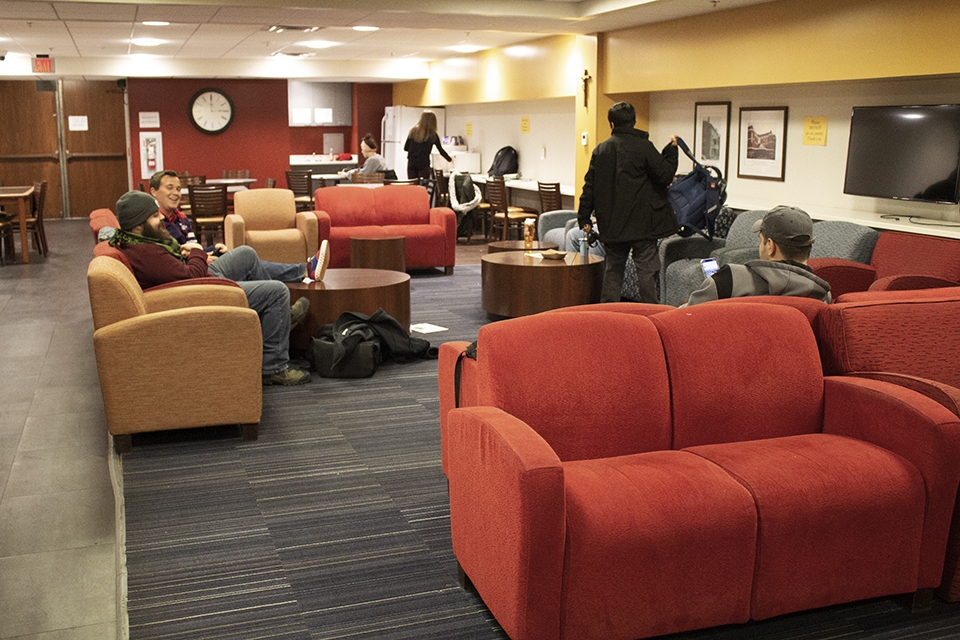

12/06/2018
By Gabriella DiPietro | News Editor
As students progress through their academic programs at Duquesne University, many eventually choose to move off campus to apartments and houses in the city and nearby South Side neighborhoods. By doing so and commuting to campus, many students gain more freedom by living on their own, maybe for the first time. A common misconception, however, is that a commuter’s social life and campus involvement continues to thrive after moving off campus.
Like many others, I lived on campus my freshman year, which granted me the opportunity to form friendships, join clubs and find my groove while transitioning to college life. Being on campus helped me to become more involved and be more social simply because I was there. It was my new home, and I needed to make it feel like home in order to be a happy and successful student. As a result, I joined the Duquesne Program Council, the Alpha Sigma Tau sorority and the Duquesne Duke, the university’s student newspaper.
For my sophomore year, however, I chose to commute. I live in Oakmont, Pennsylvania, which is a 30-minute drive from Duquesne, so it seemed to be an easy, smart and cost-effective decision.
Duquesne has a large population of commuter students, who travel from all directions to get to campus each day, bringing their own commuter experiences and stories with them. According to Timothy Lewis, director of commuter affairs, 5,465 students commute, which comprises about 58 percent of the total university population. For the undergraduate student population alone, 2,454 out of 6,135 are commuters, which equates to 40 percent.
It’s important to note that commuter students can be traditional commuters who live at home with family (like me) or commuters who reside in apartments or houses throughout the Pittsburgh area.
Nick Cipriano, a senior majoring in information systems, commuted from his home in Shaler, Pennsylvania for his first two years at Duquesne, before moving on campus his junior year.
“Being a commuter allows you to have more freedom, and you get to do your own thing because you’re not locked in to any of the housing rules and regulations on campus,” Cipriano said. “I moved on campus because as my life got busier and my classes became more intense, I just needed to be closer to it all. Living on campus and commuting are entirely different experiences, though, and I feel that people need to try both in order to fully understand the differences.”
Now, being a commuter myself, I am well aware of the disconnect commuters experience once they move off campus. Instead of meeting up with friends at midnight for an impromptu movie night in Towers, I am at home in my pajamas working on an assignment. Instead of going to Market Square for breakfast on a Saturday morning with friends, I am at the grocery store buying food for the week. Instead of walking to College Hall to attend a meeting at a moment’s notice, I am stuck in traffic, most likely to miss that meeting.
These types of situations are not new to commuter students; they have been experienced for decades by many commuters, including my parents.
My mother, Kelli DiPietro, could not afford to live on campus, causing her to commute for all five years of her studies, majoring in pharmacy. While she tried to get involved, she noted that commuting made it too difficult to be as involved on campus as other students.
“I was a part of the Red Masquers for a bit, and in an Irish singing group for a while, but it became harder and harder to do those things and still keep up with school,” Kelli said. “Sometimes, I wish that I was able to live on campus to feel more involved and less like an outsider, but you don’t always know what you’re missing until it’s over.”
She cited her experiences regarding pharmacy school, pointing out how she often felt left out or like she was missing out in some way.
“There were around a hundred people in my pharmacy class, but there were very few commuters among us,” Kelli said. “Oftentimes, students would meet up to hang out or study later in the day, but by then, most of us commuters were no longer on campus. So, I never really felt like I belonged.”
David DiPietro, my father, did not find his decision to commute to be detrimental in any way.
“It was simply the option that I chose. Granted, I don’t know what I missed out on because I didn’t seek out social things,” David said. “However, if I wasn’t a commuter, I would not have been hanging out on the fifth floor of the Union, and I may have never met my wife. Instead, I most likely would have been in my room on campus.”
Commuting requires students to plan ahead more because they no longer have the luxury of quickly stopping by their room to grab something they forgot. Instead, they are forced to think. What should I wear today? Do I need a change of clothes for the gym? What do I need to bring for class today? What am I going to eat for lunch? Will I find a place to park? Commuting forces students to ask themselves these sorts of questions every day.
Unlike resident students, commuters not only have to factor weather conditions and traffic patterns into their daily commute, but they have to locate a place to park in the zoo we call Duquesne University. Nowadays, I drive to campus and hope there is an open spot in the Locust Garage, but when my parents attended Duquesne, they had even more to worry about.
“Parking has always been an issue at Duquesne, and, though the problem has morphed, it’s an issue that still remains today,” David said. “When I went to school, the Forbes and Locust garages didn’t exist. Instead, there were just open gravel lots located on the hillsides, and you just prayed that your parking brake worked that day. If those were filled, which they often were, you had to park along the street or anywhere else you could find.”
After commuters are done with their classes each day, many choose to head home instead of hanging out on campus. Personally, I love racing home after a long day of classes because while on campus, I don’t have anywhere to go to relax. Unlike on-campus residents, I can’t go to my room to take a nap in between classes. Instead, I have to go to the library, hang out in the Student Union’s Commuter Center or occupy a table in Starbucks for hours on end.
While I have a car and have the freedom to come and go as I please, many other commuters don’t have that luxury.
“I didn’t have a car, so I had to take the bus to get to campus. My classes started at 8 a.m., so I had to wake up at 6 a.m. in order to get there on time, while residents could just roll out of bed minutes beforehand and walk to class,” Kelli said. “I used to get so aggravated when resident students didn’t show up to class because of snowy weather or something, after I got up hours beforehand in order to ride the bus and be there on time.”
While, yes, I agree that commuting offers me more freedom in life, I’ve also recognized the adverse effects of commuting. Now, I’m forced to plan everything almost to a tee, including when I get to hang with my friends, attend events or help out with activities for the organizations I’m involved in on campus. Not many students realize that until they experience it themselves.
“Students on campus have no idea how stressful it can be to commute,” Kelli said. “Compared to us, they have it easy.”




